Can Exercise Be the Anti-Aging Secret Exploring the Link Between Fitness and Aging Resistance
In an ever-evolving world where the pursuit of youth and longevity is a constant quest, the question of whether exercise can be the anti-aging secret has become a topic of significant interest. The aging process is influenced by a multitude of factors, from genetics to lifestyle choices. This article delves into the science behind exercise and its potential to combat the signs of aging, offering insights into how regular physical activity might be the key to a healthier, more youthful life.
The Science of Aging
Aging is a complex biological process characterized by a gradual decline in physiological functions. It is marked by changes in the structure and function of cells, tissues, and organs. While some aspects of aging are inevitable, others can be influenced by external factors, including diet, sleep, and physical activity.
Exercise: A Natural Anti-Aging Agent
Regular exercise has been shown to have a profound impact on the aging process. Here are several ways in which physical activity can contribute to the resistance of aging:

1. Increased Cellular Health: Exercise promotes the production of new cells and the maintenance of existing ones. This is particularly important in the case of stem cells, which play a crucial role in tissue repair and regeneration.
2. Reduced Inflammation: Chronic inflammation is a hallmark of aging and can accelerate the deterioration of tissues and organs. Exercise has anti-inflammatory properties that can help mitigate this process.
3. Improved Cardiovascular Health: A strong and efficient cardiovascular system is essential for overall health. Exercise strengthens the heart, improves blood circulation, and can lower the risk of heart disease, a leading cause of aging-related deaths.
4. Enhanced Brain Function: Regular physical activity has been linked to improved brain health, including better cognitive function and a reduced risk of age-related cognitive decline, such as Alzheimer's disease.
5. Increased Metabolism: Exercise boosts metabolism, which can help maintain a healthy weight and prevent obesity, a condition that accelerates the aging process.
Specific Exercise Benefits
- Strength Training: Building and maintaining muscle mass can improve posture, reduce the risk of falls, and enhance overall mobility, which are all important factors in aging gracefully.
- Aerobic Exercise: Activities like walking, running, and swimming improve cardiovascular health, increase lung capacity, and help control body weight.
- Flexibility Training: Stretching and yoga can improve flexibility, reduce joint stiffness, and enhance overall range of motion, which are crucial for maintaining independence as we age.
The Role of Lifestyle and Nutrition
While exercise is a powerful tool in the fight against aging, it is not the only factor at play. A healthy lifestyle, including a balanced diet rich in antioxidants, vitamins, and minerals, is also essential. Adequate sleep, stress management, and avoiding harmful habits such as smoking and excessive alcohol consumption all contribute to a more youthful appearance and extended lifespan.
Conclusion
In conclusion, while exercise cannot completely halt the aging process, it can significantly slow down its progression. By promoting cellular health, reducing inflammation, improving cardiovascular and brain function, and maintaining a healthy weight, regular physical activity can help us age more gracefully. The evidence suggests that incorporating exercise into our daily routine is a valuable step towards a healthier, more youthful life. So, let's embrace the power of movement and see the benefits it brings to our bodies and minds as we journey through the years.









